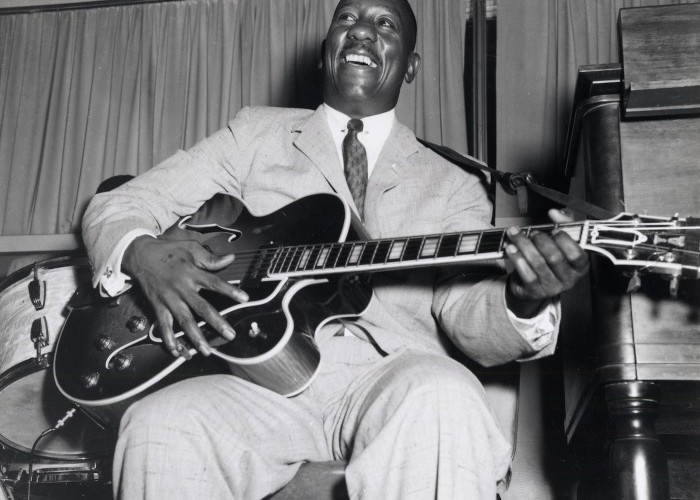Jan 13, 2026 2:09 PM
More Trump-Kennedy Center Cancellations
The fallout from the renaming of the John F. Kennedy Center for the Performing Arts to include President Donald…

A Resonance collection of Wes Montgomery material uncovers more of the guitarist’s Midwest roots.
(Photo: Duncan Schiedt)Back in 2012, Resonance Records put out a collection of Wes Montgomery recordings that represented the first full album of previously unheard music by the guitarist in more than a quarter of a century. Echoes Of Indiana Avenue helped establish Resonance, at the time a fledgeling label, as one of the leading purveyors of archival releases. “Wes Montgomery,” said Resonance co-president Zev Feldman, “is embedded in the bedrock of our company.”
Since then, Resonance has unearthed five more albums’ worth of material by the guitarist, including a recently issued two-disc set called Back On Indiana Avenue. The album showcases Montgomery in the late 1950s, before he was discovered by an audience outside of Indianapolis, where he lived. It features more than 20 tracks, including nascent versions of standards that would become hallmarks of the guitarist’s unique songbook, including “Four On Six,” “West Coast Blues,” “Jingles” and “The End Of A Love Affair.”
The recording also picks up, in a way, where Echoes left off. The tracks from both are part of the same batch of recordings made by Carroll DeCamp, an Indianapolis musician who admired Montgomery. DeCamp, who died in 2013, wasn’t credited on the first release because the tapes took a circuitous route to Resonance, having come through a guitarist named Jim Greeninger, who said he acquired the nine tracks that would make up Echoes from Orrin Keepnews, founder of Riverside Records.
Eventually, Resonance found that it had omitted a name in the chain of possession, thanks to pianist and jazz historian Lewis Porter, who knew DeCamp. Porter also helped the label track down the missing music. As it turned out, the original tapes, recorded between 1957 and 1959, had been destroyed in a 2004 fire. But fortuitously, jazz educator Jamey Aebersold earlier had made copies of the DeCamp recordings. Resonance sifted through those copies—which included the music on Echoes—to produce its latest release.
The album exists, in part, as a mea culpa: DeCamp’s name is emblazoned on the cover as an acknowledgment of the label’s debt to the man who thought to record Montgomery before many had. “I was astounded to discover that someone whom we didn’t credit made these recordings,” Feldman writes in the liner notes. But it stands out for others reasons, too. Montgomery is featured in a variety of settings, including a trio with piano and bass, and a sextet with trombone and saxophone. There’s also a cover of “So What” on which Montgomery imitates the opening lines of Miles Davis’ famous trumpet solo. DeCamp didn’t write down the personnel or the locations for his recordings; since there’s no audible clapping, it’s easy to assume they weren’t tracked live in a nightclub with an audience.
These records capture the guitarist at an inflection point. In his mid-30s, he was not yet well known outside of Indianapolis, though he had, in the late 1940s, toured with Lionel Hampton. Gunther Schuller had yet to write his glowing appraisal in the Jazz Review, which would hip jazz fans outside the Midwest to Montgomery’s singular sound. Back On Indiana Avenue, Porter said, provides listeners with a portrait of Montgomery’s idiosyncratic soloing style—defined by a progression, usually over a couple of choruses, from single-note phrases to octaves to block chords—before it became codified in the mid-1960s.
Montgomery died young, in 1968, and his discography only spans about a decade. With that in mind, it’s surprising that Resonance has managed to exhume so many recordings that previously were unknown to listeners. And Back might not be the last of them, either. Feldman said he’s working on a lead, but declined to elaborate.
Porter, for his part, said he’s aware of the possibility of an undiscovered record featuring Wes Montgomery alongside pianist John Bunch and bassist Andy Simpkins.
“There’s apparently still some Wes out there,” Porter said. DB

Belá Fleck during an interview with Fredrika Whitfield on CNN.
Jan 13, 2026 2:09 PM
The fallout from the renaming of the John F. Kennedy Center for the Performing Arts to include President Donald…

Peplowski first came to prominence in legacy swing bands, including the final iteration of the Benny Goodman Orchestra, before beginning a solo career in the late 1980s.
Feb 3, 2026 12:10 AM
Ken Peplowski, a clarinetist and tenor saxophonist who straddled the worlds of traditional and modern jazz, died Feb. 2…

The success of Oregon’s first album, 1971’s Music Of Another Present Era, allowed Towner to establish a solo career.
Jan 19, 2026 5:02 PM
Ralph Towner, a guitarist and composer who blended multiple genres, including jazz — and throughout them all remained…

Rico’s Anti-Microbial Instrument Swab
Jan 19, 2026 2:48 PM
With this year’s NAMM Show right around the corner, we can look forward to plenty of new and innovative instruments…

Richie Beirach was particularly renowned for his approach to chromatic harmony, which he used to improvise reharmonizations of originals and standards.
Jan 27, 2026 11:19 AM
Richie Beirach, a pianist and composer who channeled a knowledge of modern classical music into his jazz practice,…